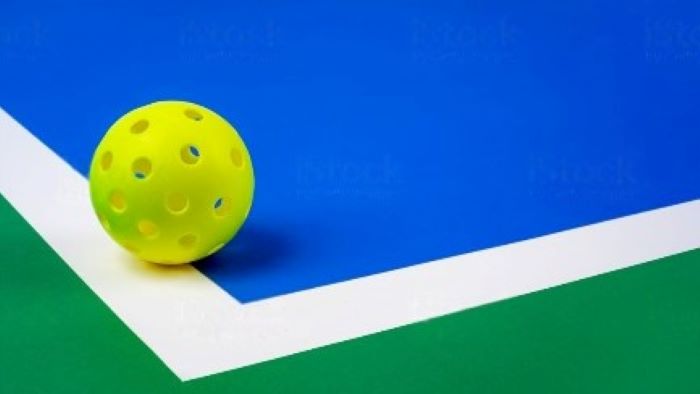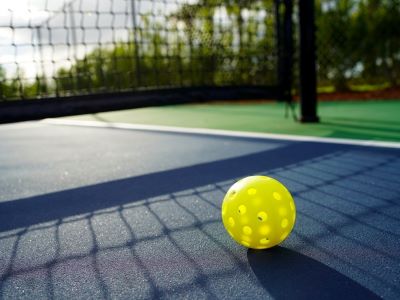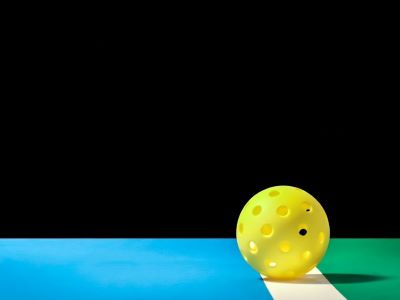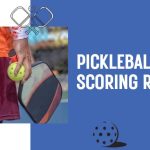If you are a pickleball enthusiast, you know how thrilling it is to hit a perfect shot that lands just inside the line.
But you also know how frustrating it is to miss a shot that goes just outside the line. And you may have experienced disagreements or confusion over line calls with your opponents or partners. How do you ensure that you make fair and accurate pickleball line call? And how do you deal with disputes or challenges over line calls?

In this article, we will answer these questions and more so you can enjoy pickleball confidently and honestly.
What Are Line Calls in Pickleball?
Line calls are simply verbal indications of whether a ball hit within or outside a line. For example, if a player shouts “out,” the ball has traveled beyond the line and out of fair play. A line call is crucial because it determines whether the rally continues or ends with a point or a fault.
Line Calls for Serves
A serve is the first shot of each rally, with special rules for line calls. The server must hit the ball with an underhand stroke over the net and into the diagonally opposite service court. Service courts are located between the baseline, sidelines, and the non-volley zone line (also known as the kitchen line). Non-volley zones are 7-foot areas on either side of the net where players cannot hit the ball (volley).
In addition to the non-volley zone line, any of the lines of the correct service court count as a serve. Any serve landing on any other line or outside of the non-volley zone is considered out.
Basic Rules of Pickleball Line Call
The basic rules of pickleball line call are:
- On the serve, the pickleball must land in the correct service court. All service court lines, except for the Non-Volley Zone line (also known as the Kitchen line), are “in.” It means that if the served pickleball lands on the sideline, centerline, or baseline, the serve is “in.” If the pickleball lands in the Non-Volley Zone (or the Kitchen), on the Non-Volley Zone line, or entirely outside the lines of the correct service court, the serve is “out.”

- On any shot other than the serve in pickleball, pickleball is “in” if it lands anywhere on the pickleball court. It includes all pickleball court lines. In other words, if the pickleball lands on the sideline, centerline, baseline, or the Non-Volley Zone line on any shot other than the serve, the pickleball is “in.” If the pickleball lands entirely outside the lines on the pickleball court, then the pickleball is “out.”
- If pickleball is “in,” the rally continues. If the pickleball is “out,” then the player/team that hit the pickleball out of bounds would have committed a fault and would lose the rally.
Who Makes the Line Calls in the Sport of Pickleball?
The players on the pickleball court make line calls in pickleball. Specifically, pickleball players make the line calls on their respective sides of the pickleball court. To note, however, players may also call Non-Volley Zone faults and service foot faults on the opponents’ side of the pickleball court (and, if there is any disagreement about the fault, the players will replay the point).
In doubles pickleball, either partner may make line calls on their respective side of the pickleball court.
There is an exception to this rule if a pickleball game or match has a referee or both a referee and a line judge. If a pickleball game or match has a referee, then the players on the pickleball court remain responsible for most line calls. However, the players will not be liable for service foot faults, Non-Volley Zone foot faults, short serves, or other Non-Volley Zone rules. Instead, the referee will be responsible for these faults, short serves, and Non-Volley Zone rules.
If a pickleball game or match has a referee and line judges, then the players on the pickleball court will not be responsible for most line calls. Instead, the players will only be responsible for making the line call for the centerline on the serve. The referee and the line judges would be responsible for the remaining faults, short serves, rules, and line calls.
Culture of Line Calling in Pickleball
Pickleball is played according to specific rules. It also requires a code of ethics for the line-calling responsibilities performed by players. The code of ethics established by the USAPA says that if a call is in question, it should be “resolved in favor of the opponent.”

The essential elements are:
- Players will call the lines on their side of the court (excluding service foot faults and all non-volley zone lines if being called by a referee).
- Players’ only line call is the centerline on the serve in matches with line judges.
- The opponent gets the benefit of the doubt on line calls made. Balls that cannot be called “out” will be considered “in.” A player cannot claim a “let” when the ball is not seen. A player may appeal to the referee to make the call if they did not see the ball land. If the referee cannot make the call, the ball is “in.”
- Spectators should not be consulted on line calls.
- A player should not question an opponent’s call, although any player may appeal a call to the referee before the score is called to start the next point.
- Requesting Opponents’ Help. A player might ask the opponent’s opinion if the opponent was in a better position to make a line call on the player’s side of the court. Players looking down the line are more likely to be accurate than those looking across the line. Opponents’ opinions, if requested, must be accepted.
Resolving Disputes Over Pickleball Line Calls
Disputes may arise over pickleball line calls, especially in competitive or tournament settings. Here are some tips on how to resolve them respectfully and fairly:
- If you are unsure about a line call on your side of the court, you should give your opponent the benefit of the doubt and call it “in.”
- If you disagree with your opponent’s line call on their side of the court, you should ask them politely if they are sure about their call. If they confirm their call, you should accept it and move on. If they change their mind, you should thank them and replay the point if necessary.
- If you have a referee or line judge, you should respect their authority and decisions. You can appeal to them with a valid reason, but you should not argue or complain with them.
- If you have a dispute that the players cannot resolve, the referee or the line judges, you should contact the tournament director or the USAPA representative for assistance.
- If you have a dispute that involves a rule violation or misconduct, you should follow the official procedures for filing a complaint or protest with the USAPA.
FAQs
The pickleball lines are called the sideline, the centerline, the baseline, and the non-volley zone line (or the kitchen line). They mark the boundaries of the court and the zones where different rules apply.
A pickleball player should not call the line on their partner’s side unless their partner asks for their opinion or cannot make the call. The player closest to the ball with the best line view should make the call.
Yes, you can hit the line in pickleball, except on the serve. The ball is in on any shot other than the serve if it touches any part of the line. The ball is out on the serve if it touches the non-volley zone line (or the kitchen line).
Well, That’s a Wrap!
Line calls are essential to pickleball, as they determine whether a ball is in or out of play. They also reflect the culture and values of pickleball, such as sportsmanship, honesty, and respect.
By following the rules and etiquette of line calling, you can ensure that your pickleball games are fair and fun for everyone involved. And by resolving disputes or challenges over line calls respectfully and politely, you can avoid conflicts and maintain good relationships with your opponents and partners.
So, the next time you play pickleball, remember to make the right call and enjoy the game!

I am a professional physiotherapist and the author of the BallSportsPro. I worked with athletes of all levels, from amateur to professional, and i helped them overcome injuries and improve their performance. I am a certified Pickleball instructor and has been playing the sport for over 10 years.




